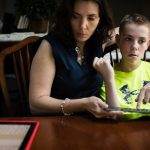The COVID pandemic has laid bare the extent of inequalities across Connecticut’s cities, towns, and school districts and the children and families they serve. Connecticut has long been one of our nation’s most racially and economically segregated states, while also one of the wealthiest. In the past decade those inequities have worsened along both economic and racial lines. In 2021, Connecticut continues to face the interrelated challenges of segregation and school funding equity and adequacy. Connecticut must do better.
When 2020 began, we had no clue as to the changes coming to our children’s education. Looking to the new year, the only thing that seems certain is that uncertainty in school opportunity, format, and structure will continue as the conditions around us adjust. School will carry on as unpredictable and unprecedented.
We may be tired of being asked to look for silver linings, or bright prospects, to the changed education landscape. But here’s why it’s important to check our expectations and consider shifts in how we frame this school year.
To learn more about the man now poised to lead the nation’s schools, Connecticut Public Radio’s Diane Orson spoke with Robert Villanova, director of the Executive Leadership Program at UConn’s Neag School of Education. He said he and Cardona first met when Cardona was principal at Hanover Elementary School in his hometown of Meriden.
Kiplinger contributor (and former Major League Baseball player) Doug Glanville shares insights from years playing the game — and investing.
Friendships are powerful and positive – especially friendships between members of historically marginalized groups like women, people of color, and LGBTQ individuals. In a paper recently published by the journal Human Resource Development Review, lead author Kristi Kaeppel ’20 Ph.D., a graduate assistant with the Center for Excellence in Teaching and Learning; adjunct professor of philosophy at UConn Stamford and School of Business academic advisor Emma Björngard-Basayne ’15 MA, ’18 Ph.D.; and Grenier argue that workplaces that value and promote friendships can enhance the well-being of their workforce – to the benefits of both the individuals and the institutions.
We call them our colleagues, our peers, our mentors, or our coworkers – they are the people in our professional lives that also share in the details of our personal lives, who we associate with voluntarily, and who we trust with our thoughts, our experiences, and our fears.
Outside of work, we might call these relationships “friendships,” but it’s rarer to hear that particular f-word at the office – and the reason has to do with more than just semantics.
The University of Connecticut has been awarded a $179,000 grant from the U.S. Department of Education’s Office of Postsecondary Education for a new research project centered on reimagining dual language education. The project’s purpose is to improve the ability of dual language programs to promote the equitable bilingualism and biliteracy development of all students through a greater focus on sociocultural competence.
Children don’t come with how-to manuals. Even if they did, they would all require a manual of their own, tailored to their unique make and model. That’s why caregiving can be rewarding, as well as puzzling and demanding – particularly for family caregivers of children with disabilities. Although these caregivers often report that the role gives them a sense of purpose, it usually comes with physical, emotional and financial strains. COVID-19 has added major hurdles to accessing, delivering and evaluating special education services.
Children don’t come with how-to manuals. Even if they did, they would all require a manual of their own, tailored to their unique make and model. That’s why caregiving can be rewarding, as well as puzzling and demanding – particularly for family caregivers of children with disabilities. Although these caregivers often report that the role gives them a sense of purpose, it usually comes with physical, emotional and financial strains. COVID-19 has added major hurdles to accessing, delivering and evaluating special education services.




